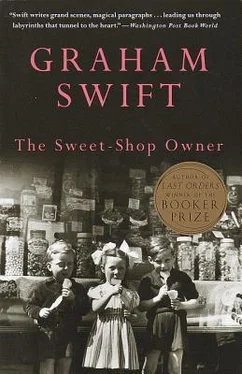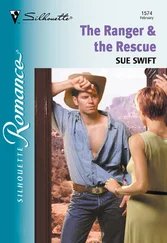Graham Swift - The Sweet-Shop Owner
Здесь есть возможность читать онлайн «Graham Swift - The Sweet-Shop Owner» весь текст электронной книги совершенно бесплатно (целиком полную версию без сокращений). В некоторых случаях можно слушать аудио, скачать через торрент в формате fb2 и присутствует краткое содержание. Год выпуска: 2012, Издательство: Vintage Books USA, Жанр: Современная проза, на английском языке. Описание произведения, (предисловие) а так же отзывы посетителей доступны на портале библиотеки ЛибКат.
- Название:The Sweet-Shop Owner
- Автор:
- Издательство:Vintage Books USA
- Жанр:
- Год:2012
- ISBN:нет данных
- Рейтинг книги:4 / 5. Голосов: 1
-
Избранное:Добавить в избранное
- Отзывы:
-
Ваша оценка:
- 80
- 1
- 2
- 3
- 4
- 5
The Sweet-Shop Owner: краткое содержание, описание и аннотация
Предлагаем к чтению аннотацию, описание, краткое содержание или предисловие (зависит от того, что написал сам автор книги «The Sweet-Shop Owner»). Если вы не нашли необходимую информацию о книге — напишите в комментариях, мы постараемся отыскать её.
The Sweet-Shop Owner — читать онлайн бесплатно полную книгу (весь текст) целиком
Ниже представлен текст книги, разбитый по страницам. Система сохранения места последней прочитанной страницы, позволяет с удобством читать онлайн бесплатно книгу «The Sweet-Shop Owner», без необходимости каждый раз заново искать на чём Вы остановились. Поставьте закладку, и сможете в любой момент перейти на страницу, на которой закончили чтение.
Интервал:
Закладка:
‘Well, there is no use disguising the fact,’ she said, easing herself into her seat and pursing her lips.
She had come home that morning after two weeks in hospital; he’d left Mrs Cooper in charge of the shop. Somehow he hoped a new woman might have returned to him, but he saw by that flatness of the lips, it was not so.
‘A heart condition is a heart condition,’ she continued.
It was almost Christmas, and cold. Outside, the garden looked damp and raw. She asked for a blanket and he got her one — the large red and brown blanket which they’d used as a picnic rug in the days of their Sunday drives. She asked for her handbag and her medicines and he put them on the trolley beside her chair, along with the inhaler, the papers, and the antique collectors’ journals which she still liked to scour, sending off for catalogues. She looked very weak. But only once, as he tucked the blanket round her and felt for a moment like a father putting a child to bed, had her expression admitted this weakness. And then it was in the form of resentment, annoyance. Her mouth twisted curiously as he leant over her.
He stayed at home with her all that day. She spoke briefly about what the doctors said. There was a risk: no exertion; precautions must be taken. And he talked about the shop. He didn’t anticipate such large Christmas sales this year — but he’d said the same the year before.
Then he was going to ask: ‘Should we be thinking about selling the shop?’
But that evening she said, as if to forestall him, ‘I think we should get another shop.’ And in the new year they bought Pond Street.
29
‘I’ll be off to Pond Street then, Mrs Cooper.’
He stood in the doorway, parting the plastic strips, having exchanged his shop coat for his jacket, rinsed his hands and face, and put the wage-packets from the safe — they were made up differently this week — in his briefcase.
Mrs Cooper had returned, puffing, from her shopping, with an air of accusation, as if she were about to discover some scandal. Sandra had slipped out, to her own lunch, pressing a new stick of chewing gum into her mouth, and as she passed Mrs Cooper in front of the counter the two women had glowered icily at each other.
‘Have you eaten?’ Mrs Cooper asked him, and without waiting for a response she turned to rummage in her shopping bag. ‘I got a sandwich from the snack bar — chicken, you can eat that. And there’s some apples from Powell’s.’
‘That’s kind of you.’ He pushed the bags to one side. ‘Later, eh?’
Magnanimously, she waved aside the coins he held out to her.
‘Don’t be silly. You’ll be back within the hour then? Before she comes back.’
‘No, Mrs Cooper. I imagine I’ll be quite a while. I thought I’d walk.’
‘Walk!’
Mrs Cooper stared wildly.
‘It’s the other side of the common! You’ve never walked to Pond Street before, you’ve always driven.’ The lump rose and quaked in her throat. ‘Mr Chapman, be sensible! In this heat — with your leg — and when the doctor keeps telling you not to overdo it. You might —’ her voice suddenly lost all subtlety — ‘What on earth do you want to walk for?!’
He’d predicted all this. It was almost amusing to watch it occurring just as he expected.
‘I have my reasons, Mrs Cooper. It is ’ — he nodded to the doorway — ‘a fine day.’
He stooped to shut the catch on his briefcase and do up the straps.
She looked unbelievingly at him.
‘You’re a fool,’ she said with sudden involuntary force. Then seemed dazed by her own words.
He raised his head.
‘That’s as may be,’ he said calmly.
He did up the second strap on the briefcase and straightened his jacket. She stood aside, stunned, as he lifted up the flap in the counter and nodded as he said, ‘Look after things, won’t you?
‘Bye now.’
‘Bye.’ She couldn’t say anything else.
The toy monkeys shook over the counter as he shut the shop door. She watched him turn right, then cross the road and stand poised for a while on the traffic island.
Why had she said those words to him? A sudden panic seized her.
But she’d meant them.
He stepped onto the opposite kerb. There was only the dull ache in his chest. Black trickles of melted tar gleamed in the gutter, and the cars as they gusted by seemed to raise a hotter, not a cooler draught. He walked through the thick shadows of the trees on the paving-stones, as if entering some long-rehearsed scene. And as he walked they noticed him: Hobbes; Simpson, behind his cool green and blue chemist’s bottles; the secretary in Hancock’s, sitting back now from her typewriter while the boss was at lunch. And they wondered, what was he doing, Mr Chapman, who was only ever to be seen in his shop or driving to and from it, and who never walked anywhere — except to the bank?
Simpson’s, Hancock’s, the Diana. On the corner, under the faded, dark-green awning, the wasps buzzed over Powell’s strawberries and plums. And there, in the shady recess of the shop, as if he really had nothing to do with the sun and the bright fruit on his stalls, in his grey, eternal cardigan which seemed to match his bloodless skin and ashen hair, old Powell himself, raising a hand, half surprised, as he passed. He would never know if it was true: that scar that was supposed to cover half his body.
Traffic filtered out of Allandale Road. A bus, a delivery van. And there, on the opposite corner, outside the Prince William, like holiday-makers, they sat and sprawled, shirts unbuttoned, glasses shining, with ten more minutes of drinking to go.
He turned into Allandale Road. As he did so, Hancock emerged, on the opposite side, from the back-entrance to the saloon, squaring his shoulders, raising his head but blinking in the brightness. And blinking too, as he crossed the road, at the sight of the sweet shop owner on the pavement with his briefcase.
The same and not the same. I once joked about the Prince William, Dorry. I said to Irene: ‘The Prince Willy — they named it after me.’
That was one evening before the war, when I was still preparing the shop for opening, and I asked her to meet me, at six, in the Prince William. There was a beer garden then, grass and wooden tables and cherry trees — where Armstrong’s garage is now — and there was a big wooden pub sign hanging at the front: Prince William himself in a bronze breastplate, sash and wig, and a smoky background suggestive of battles and storms. That was the only time the High Street regulars saw Irene. They looked at her, over their drinks, and perhaps they confided to each other later, already spreading my legend: ‘That woman with that new feller, Chapman, in the pub last night. You’ll never believe it — his wife.’
I told her to meet me after work and to wear the blue and white dress she wore on our honeymoon, because I wanted just one perfect evening. She came. She wore the dress. She looked like someone acting under instructions. She sipped the Pimms I bought her; she smiled across the wooden table, and even laughed at my joke, because she knew this was expected of her and it wouldn’t happen again and I must have one perfect picture …
I still keep that picture, Dorry. A mental photograph. Though the beer garden’s gone, Prince William in his breastplate’s gone … and she’s gone.
We walked back over the grass of the common, under the trees. How green this part of London always was. And up in the bedroom, behind the green curtains, the scent of Pimms and lemon on her lips … I let you touch me but I’m not touched, I let you take me but I’m not possessed, I let you …
That was in ’38. Two weeks later I slipped off a ladder and damaged my back. And a year after that — that was after the shop opened and Mother and Father died — the war broke out. But I didn’t fight. I wasn’t fit for active service. I only learnt to count, to number, not to touch.
Читать дальшеИнтервал:
Закладка:
Похожие книги на «The Sweet-Shop Owner»
Представляем Вашему вниманию похожие книги на «The Sweet-Shop Owner» списком для выбора. Мы отобрали схожую по названию и смыслу литературу в надежде предоставить читателям больше вариантов отыскать новые, интересные, ещё непрочитанные произведения.
Обсуждение, отзывы о книге «The Sweet-Shop Owner» и просто собственные мнения читателей. Оставьте ваши комментарии, напишите, что Вы думаете о произведении, его смысле или главных героях. Укажите что конкретно понравилось, а что нет, и почему Вы так считаете.












